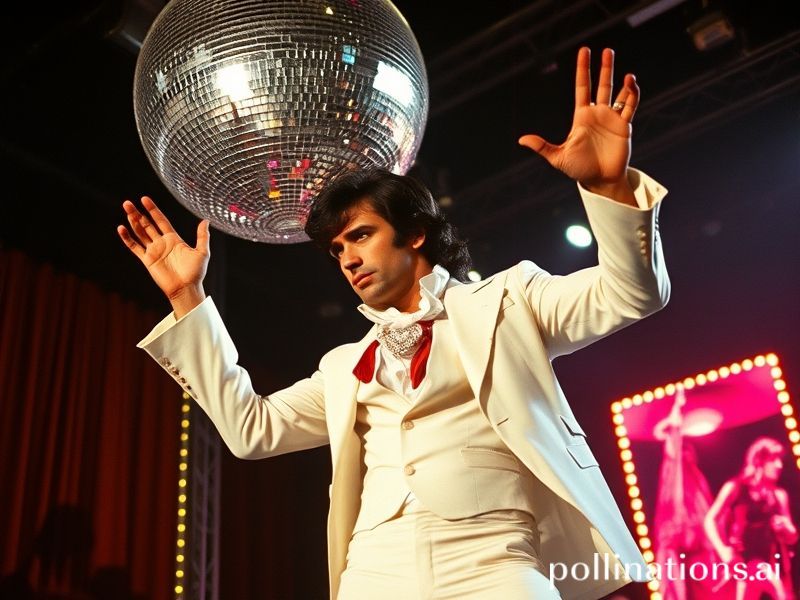Travolta Without Borders: How a Disco Has-Been Became the World’s Favorite Cultural Glitch
John Travolta and the Global Masquerade: How a Disco King Became the Planet’s Favorite Glitch
PARIS—Somewhere between a French disco in 1977 and a Kazakhstani meme in 2024, John Travolta transcended mere Hollywood stardom and became a passport-stamped, universally mispronounced cultural glitch. The Italians call him “Giovanni il Travolgente,” the Japanese have a verb, toraboruta-ru, meaning “to dance badly but with heroic sincerity,” and in Lagos nightclubs his Saturday Night Fever pose is still the fastest way to clear a dance floor for Instagram. That is the paradox we must confront: a man who once struggled with Scientology syllables is now a lingua franca more reliable than the euro.
The world has always outsourced its dreams to Los Angeles, but Travolta’s career arc offers a darker parable about global taste. Start with the obvious: Grease was the first American musical translated into Mandarin where the subtitles actually improved the dialogue. In Cold-War-era Poland, bootleg VHS copies of Urban Cowboy circulated like samizdat; authorities assumed the mechanical bull was a metaphor for capitalism, which, to be fair, it was. Even North Korea’s elite film school screens Pulp Fiction—sans gimp mask—to demonstrate the decadent West’s obsession with foot massages and moral ambiguity. One man’s pulp is another’s propaganda.
Then came the collapse of 1989—not the Berlin Wall, but Travolta’s Look Who’s Talking Too phase. While economists debated the End of History, the planet’s multiplexes endured the End of Dignity. Yet that nosedive proved useful. In post-Soviet Russia, battered VCRs looped Look Who’s Talking Now (yes, the one with the dogs) to teach toddlers capitalist intonation: babies demand, therefore supply chains exist. A generation of oligarchs cut their teeth on Bruce Willis wisecracks and Travolta’s wounded puppy eyes. The seeds of the 1998 ruble crisis, arguably, were fertilized by bad sequels.
Quentin Tarantino’s resurrection of Travolta in Pulp Fiction arrived just as global supply chains were resurrecting post-Cold-War Russia. Coincidence? Ask a Siberian cinema owner who swapped Kalashnikovs for Kahuna burgers and still thanks Saint Quentin every Orthodox Christmas. Travolta’s Vincent Vega—stoic, stoned, geographically confused—became the template for every expat contractor from Dubai to Djibouti. The Royale with Cheese monologue is now required study at the Sorbonne’s American Pop Culture department, right after de Tocqueville, because nothing explains U.S. exceptionalism like a hitman comparing metric systems while en route to a murder.
Meanwhile, the planet’s meme economy discovered that Travolta’s blank, searching stare in Pulp Fiction GIF form is the perfect reaction to everything from Brexit to your aunt’s WhatsApp conspiracy about 5G mind control. A Senegalese digital artist recently sold an NFT of Travolta wandering lost through the Dakar airport arrivals hall; it went for 14 Ethereum, enough to fund a small solar grid. The piece is titled “Where the Hell Is Baggage Claim, Again?” Critics hailed it as neo-colonial satire. Travolta, presumably, just wondered why everyone was suddenly speaking Wolof.
Of course, no global icon survives without scandal. The whispered allegations, the lawsuits, the Scientology whisper-network that stretches from Clearwater to Cannes—all of it merely certified his authenticity. In an era when politicians get canceled for decade-old tweets, Travolta’s 1970s chest hair remains gloriously unapologetic. The United Nations may debate carbon credits, but the real international consensus is that Travolta’s hairline defies both physics and morality.
So what does it mean that a man who once danced in bell-bottoms now pilots his own 707 (named Jett Clipper Ella, because subtlety died with disco) and still lands uninvited at tiny Scottish airports to wave at bewildered baggage handlers? It means the world stage loves a comeback wrapped in camp and engine fuel. It means that as climate summits collapse in recrimination, a 69-year-old actor can still unite humanity in the shared realization that we, too, would like to dance like no one’s watching, then realize—too late—that everyone is, and they’re filming vertically.
In the end, Travolta isn’t just an American export; he’s the planet’s collective guilty pleasure, a polyester reminder that global culture runs on recycled delusions and excellent choreography. And if that isn’t worth a cynically amused shrug, what is?







